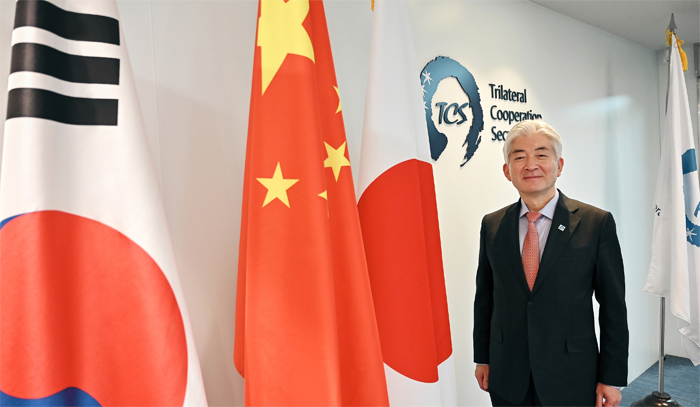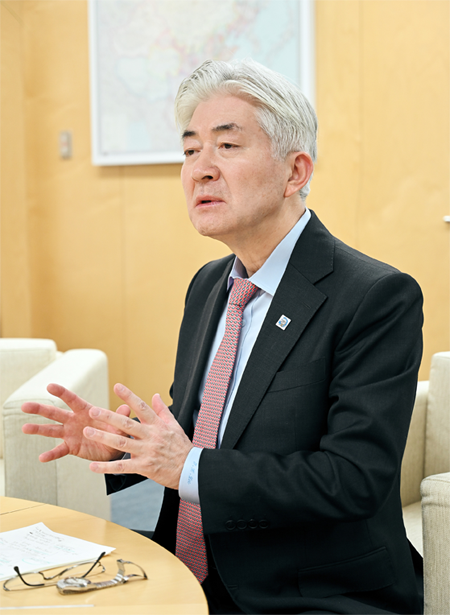 Lee Jong-heon, Secretary-General of the Trilateral Cooperation Secretariat: ‘We will expand trilateral cooperation to bring substantial benefits to three nations.’
Lee Jong-heon, Secretary-General of the Trilateral Cooperation Secretariat: ‘We will expand trilateral cooperation to bring substantial benefits to three nations.’
Korea has China on its left and Japan on its right: in Korea, these two countries are known as old neighbors. The trio have shared similar cultures over a long history, giving and taking influences, and have secured outstanding positions on the global scene, growing and developing through fierce competition. Now, as Korea, China, and Japan jointly face the new mission of prosperity and peace in Northeast Asia, the three countries need to go beyond the framework of old-fashioned bilateral relations for a greater vision of trilateral cooperation. The KF sat down with Lee Jong-heon, Secretary- General of the Trilateral Cooperation Secretariat (TCS) to hear more about his views on the further development of friendship and exchange among the three countries.
It is easy to guess the work of your organization from its name. Nevertheless, could you give us an introduction of the TCS and its activities?
The TCS is an international organization launched in 2011. It was conceived in a meeting of the leaders of Korea, China, and Japan in 1999 during the ASEAN+3 Summit, where the three governments signed and ratified agreements to the effect of founding the secretariat. Our vision is enabling the peoples of the three countries to enjoy peace and prosperity, and to that end we carry out projects through our four departments that respectively deal with political affairs, economic affairs, socio-cultural affairs, and management and coordination.
Our activities can be divided into three categories—carrying out projects that have been promoted by governments, rendering support for smooth trilateral consultations, and independently exploring and operating prospective projects. In addition, we seek ways of enhancing understanding about trilateral cooperation and working together with other international organizations and conduct research and build databases that will be helpful for cooperation among the three countries. At the moment, the TCS has three members. But we have to bear in mind that our scope can be expanded to include Russia, Mongolia, and North Korea.
Among the nations of the world, there is most likely no other trio that has as many exchanges as Korea, China, and Japan have with another. There certainly will be a variety of exchanges among the three countries in the coming days. In what particular field do you think cooperation should be expanded to bring the highest degree of mutual benefits to the three nations?
In the case of Korea, Japan, and China, confrontation and antagonism among the central governments tend to reduce or weaken exchanges between local administrations and private-level contacts: this tendency is not helpful for the development of the three countries. Even if there are political and diplomatic ups and downs, exchanges in certain fields should be unaffected and expanded in a way to bring substantial benefits to the peoples and contribute to the betterment of their quality of life. An example is exchange in the field of non-traditional security, where geographical proximity can make winners of all three countries. “Fields” include environmental protection, disaster management, health and sanitation, transnational crimes, and food security, such as agro-fisheries produce.
When the three nations successfully wrap-up ongoing negotiations about free trade agreements, cooperative ties will be upgraded, offering greater benefits to their peoples. Now, the world is moving from an era of globalization toward an era of “slowbalisation,” which requires strengthening and expanding regionalism involving neighboring countries and mutual cooperation among them. Korea, Japan, and China should also expand their future-oriented interactions.
Last year, your secretariat conducted a public opinion survey of the peoples of the three countries. The result showed that only 30–40 percent of the respondents felt a sense of trust and familiarity towards peoples of the other countries and vice versa. How would you interpret these results?
The survey was conducted on 1,000 people in each country. The rate of people feeling close to the other two countries was not so high, but we don’t have to take this figure too seriously. In the 1980s and 1990s, when trilateral relations were good, the rate topped 80–90 percent. In other words, the rate can go up or down according to the year the survey is conducted.
Instead of the rate, we have to pay more attention to the fact that the peoples of the three countries shared the need for cooperation. About 82 percent of respondents agreed on the need for tripartite cooperation, and 87 percent said that current levels of cooperation should be further developed and strengthened. We could confirm that the peoples of the three countries viewed the trilateral relations as a neutral and progressive value, and that is what counts as the most meaningful aspect of the survey.
To improve the three peoples’ perceptions of each other, what public diplomacy endeavor should be made, and in what ways? Could you explain the role of the secretariat in these efforts?
The three countries are geographically close, but they have different geopolitical characteristics, as one belongs to the continent, one is a peninsula, and one is an island nation. Naturally, their values and ways of thinking and understanding differ from one another. However, they share the common belief that each one can grow and develop only when all three cooperate. The peoples themselves should beware of taking antagonistic attitudes and fixed negative ideas of their neighbors and, in the event of disputes, need to view the issues from the perspectives of the others.
Last year, approximately 30 million foreigners visited Japan, including about 7.5 million visitors each from Korea and China. In other words, Korean and Chinese visitors made up half of the foreign visitors to Japan. We cannot say that more visits mean better understanding, but we can suggest that more visits narrow differences. The TCS organizes and sponsors the Trilateral Journalists’ Exchange Program and joint coverage to emphasize the importance of mass media in promoting mutual understanding and cooperation. We also support communication and contact between journalists through diverse channels.
In the meantime, we hold a wide variety of public diplomacy events with the hope of expanding ties in the field of culture and humanities. Most recently, we invited architects from each of the three countries to a forum, where they talked about the contemporary architecture of East Asia and the culture, technology, and philosophy embedded in it as well as design strategy. It was a significant occasion for comprehending the architectural evolution of the three countries on the basis of mutual influences and to seek directions for further development.
What kind of exchange can be conducted for the growing generations who will lead the three nations in the future? If the TCS, in this regard, has concrete programs which have been already carried out or are under preparation, please tell us about them.
We cannot deny or forget the unfortunate aspects of the shared history of the three countries. If we become obsessed with it, however, it will only be a hindrance to the development of trilateral relations. The future generations, including today’s youth, need to increase exchange and communication with the neighboring countries. We hosted the Trilateral Youth Summit, where 30 undergraduate and graduate students from the three countries discussed cooperation for shared development in Northeast Asia. We conducted the Young Ambassador Program to enhance the young peoples’ understanding of trilateral cooperation and operate exchange programs aimed at increasing understanding and strengthening friendship and sense of community. We have 17 groups involving 40 colleges and universities of the three countries and are building infrastructure for cooperation among college students through the Campus Asia program, which invigorates the system under which students may earn joint degrees or earn degrees by credit sharing.
Our projects are not targeted only at college students and young adults: we also provide opportunities for international exchange for elementary-aged children and junior high school students in provincial areas. We are considering diverse programs for children that can serve as the foundation on which future generations may grow up building friendships with children of neighboring countries without being prejudiced against them. One representative program is the Crested Ibis International Forum. The crested ibis was nearly extinct in Korea and Japan but has come back thanks to a donation from China, and the bird has also become a symbol of trilateral friendship and cooperation. In the spring of last year, the Crested Ibis International Forum was held in China, and elementary school students from Changnyeong-gun in Korea’s Gyeongsangnam-do Province attended the meeting to give a performance and watch the proceedings. It was truly rewarding to see children of the three countries get together and quickly become friends.
The TCS and the KF co-hosted the Trilateral Forum on Public Diplomacy last year. Could you brief our readers on the forum? Do you think a similar event can be held this year?
Last year was the first time that the TCS co-hosted the Trilateral Forum on Public Diplomacy, and it was a very successful and meaningful event. Under the theme “Trilateral Cooperation for Enhancing Friendship, Understanding, and Trust,” local government officials, journalists, scholars, and university students from China, Japan, and Korea talked about expanding exchange within Northeast Asia at various levels. Public diplomacy is usually recognized as a term referring to bilateral relations, and to my great satisfaction, the forum was instrumental in broadening the concept so that it can be applied to trilateral relations. If possible, we hope to be able to host these forums annually.
You are the fourth Secretary-General of the TCS and the second Korean to serve in that position. Do you have any tasks you wish to carry out during your term in office?
I don’t think I have any special agenda to carry out during my term. There is, however, a goal I have been pursuing and preparing for over five years from the time I was deputy Secretary-General: the systematization of trilateral cooperation beyond bilateral relations among Korea, China, and Japan. Bilateral relations are liable to the direct influence of governments and political situations. However, trilateral relations can accommodate for this weakness in a systematic manner. I have high hopes for establishing the concept of trilateral cooperation in a way that helps the peoples of the three countries understand and sympathize with it, and I will channel my efforts and energies into this mission.
Once these foundations are solidified, I wish to expand ties with the Korea-China-Japan Network of Trilateral Cooperation Think-Tanks and study such examples of regional organizations in other continents (e.g. Nordic Council, Visegrád Group) and increase contacts with them. I will spare no effort in supporting governmental agencies working for cooperation and assisting in activities of non-governmental organizations and private communities. When it comes to trilateral cooperation, the bottom-up style of exchange initiated by the peoples—the citizens and the public—is as crucial and significant as top-down exchange among national leaders. All TCS staff, including myself, will strive to attain these goals.
Lastly, do you have any words for KF Newsletter readers?
The KF is doing a wonderful job of properly and accurately promoting Korean culture to the outside world. Considering Korea-Japan-China relations and the regional context of Northeast Asia, there should be many projects through which the KF and the TCS can complement each other for a synergy effect. I also hope to see more exchange of all types between our organizations. I also hope KF Newsletter readers continue to follow the activities of the TCS with interest as we work for the progress of trilateral cooperation.
Interviewed by Kim Daniel

 KOREA FOUNDATION
KOREA FOUNDATION newsletter
newsletter










